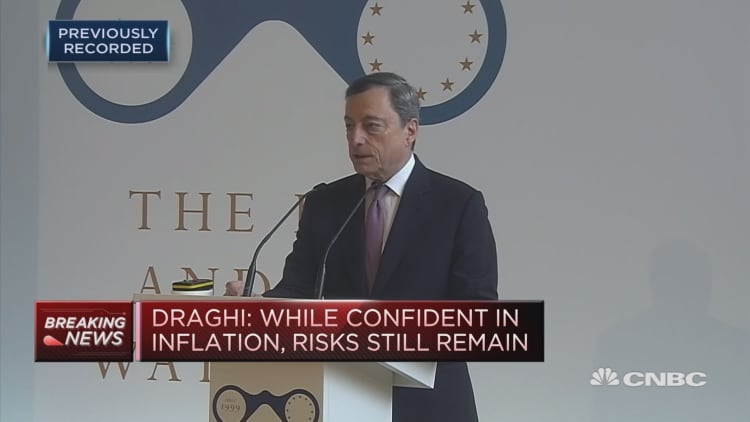
European Central Bank President Mario Draghi said Wednesday that the bank's policy will remain prudent despite it being more confident on the future path of inflation.
"We currently see inflation converging towards our aim over the medium term, and we are more confident than in the past this convergence will come to pass," Draghi said at an event in Frankfurt.
"But we still need to see further evidence that inflation dynamics are moving in the right direction. So monetary policy will remain patient, persistent and prudent."
The overall improved economic momentum in the euro zone led the central bank to change its communication last week. The ECB dropped its so-called easing bias — a statement that used to indicate the bank would increase the level of its bond purchases in both duration and size if the economic outlook deteriorates.
"There's been a moderate change in communication… that is an indication they feel the need to recognize the massive improvement in the economy and the improvement in inflation," Volker Wieland, endowed chair of monetary economics at the Institute for Monetary and Financial Stability, told CNBC Wednesday.

"Looking at the euro area overall, it is really time to move forward (towards normalization)," he added.
Rates will still remain low
However, speaking on Wednesday, Draghi reiterated that rates will still remain low for a long time.
"As regards the evolution of our policy rates beyond the end of our net purchases, we will maintain the sequencing that is currently set out in our forward guidance, namely our pledge to keep key interest rates at their current levels 'well past' the end of net purchases," Draghi said in Frankfurt.
The ECB introduced record low interest rates, alongside a massive bond-buying scheme, following the euro zone debt crisis of 2011 in order to stimulate lending and boost growth. Its three main rates are: the interest rate on the main refinancing operations (MRO), the rate on the deposit facility and the rate on the marginal lending facility. They are currently at 0, -0.4 and 0.25 percent.
Draghi argued that communicating that these rates won't change for a long time ensures that "our policy stimulus is not weakened by premature expectations of a first rate rise." Markets are currently looking for a first rate hike in the euro zone some time in 2019.

However, the ECB Chief Economist Peter Praet said Wednesday that the markets will seek more clarity as to how long "well past" the end of net purchases means.
Speaking at the same conference, he said: "With the passage of time, the indication that policy rates will remain at their present levels well past the end of net asset purchases will gradually cease to provide sufficient guidance about the likely evolution of the monetary policy stance."
"So, our forward guidance on the path of our policy rates will have to be further specified and calibrated as appropriate for inflation to remain on the sustained adjustment path," he added.
Euro slips lower
With regards to inflation, the ECB decided last week to revise its inflation forecasts lower for next year but it kept them unchanged for 2018 and 2020. At the moment, annual headline inflation is expected to hit 1.4 percent in 2018, 1.4 percent in 2019 and 1.7 percent in 2020.
The euro traded slightly lower following Draghi's comments at "The ECB and Its Watchers" on Wednesday. The currency traded at $1.2373 against the dollar at about 9:00 a.m. London time, about 0.12 percent lower for the session.
The currency has been mostly on an upward trend since the start of the year and analysts believe this will continue throughout the year. As a result, the ECB has been keeping an eye on the exchange rate, fearing that a very strong euro could derail its plans for monetary policy.


